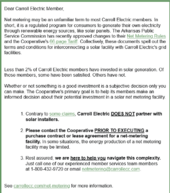Got an Email from the Co-op the other day. I thought it was interesting especially concerning the State changes to Net metering installations. Arkansas has mandated that electrical companies provide a 1 to 1 net meter arrangement. As you would guess this meant the companies put many obstacles in place to discourage grid tie setups. With the latest rounds from the State it looks like the old agreed setups can continue without export meters till 2030 but new ones will be required to have the dual meter setups. I am sure that in spite of the "We are here to help you " the hoops and cost to get a new interconnect agreement is mind blowing.
As to the less than 2% consumer adoption of solar generation I expect that is simply the grid tie ones the Co-op has officially allowed. I think there is a great deal more unnoticed or approved setups. Off grid especially. Probably the biggest reason for limited PV adoption is the low electrical rates of ~8cents per kWh though the monthly connection fees have more than doubled to about $24/mo.

As to the less than 2% consumer adoption of solar generation I expect that is simply the grid tie ones the Co-op has officially allowed. I think there is a great deal more unnoticed or approved setups. Off grid especially. Probably the biggest reason for limited PV adoption is the low electrical rates of ~8cents per kWh though the monthly connection fees have more than doubled to about $24/mo.



